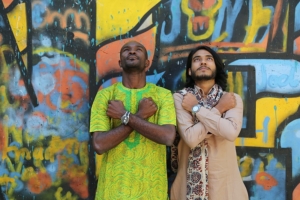Wakanda Today: Black Panther Inspires Africa
 When Black Panther graced the big screen in 2018, it altered the landscape of the Marvel Cinematic Universe. Fans marveled at the rise of T’Challa, played by the late Chadwick Boseman. He claimed his birthright amid civil dispute and protected his people from colonization. Fans from every background admired their new hero and shouted “Wakanda Forever” upon leaving the theater.
When Black Panther graced the big screen in 2018, it altered the landscape of the Marvel Cinematic Universe. Fans marveled at the rise of T’Challa, played by the late Chadwick Boseman. He claimed his birthright amid civil dispute and protected his people from colonization. Fans from every background admired their new hero and shouted “Wakanda Forever” upon leaving the theater.
In the wake of Chadwick Boseman’s death, Black Panther’s influence moved to the forefront of public conversation. At the same time, Marvel fans mourned the loss of their beloved hero and debated possible replacements for the title character, Black Panther-inspired Africa, to reassess its development strategies. Wakanda might be a fictional country, but the World Economic Forum claims it represents a technologically driven and socio-economically responsible vision for Africa.
An Ideal Africa
Wakanda embodies the United Nations 2020 Sustainable Development Goals as it presents an Africa with gender equality, no hunger, no poverty, good health, well-being and clean energy sources. While Africa cannot thrive on the fictional substance of “vibranium,” the World Economic Forum believes it can realize Wakanda’s “4.0 Globalization” by investing in its people, industries and governments. Here are three ways Black Panther is inspiring Africa’s development.
Youth Employment Opportunities
Like Black Panther, African communities see younger people as a developmental asset. T’Challa believed in youth, like his sister Shuri, and the African Development Bank Group does as well.
A 2019 study by the African Development Bank Group found 420 million unemployed young people in Africa, making them a valuable, untapped resource. The World Economic Forum suggested that Africa create over 130 million jobs for young people, doubling the number of opportunities currently available to spur economic growth across the continent. Indeed, the working-age population could increase productivity in industries, ensure economic prosperity and lower poverty rates.
Government Support of SMEs
Wakanda’s economy rivaled that of the most developed countries in our world. Again, “vibranium” will not stabilize African economics as it does not exist. However, the World Economic Forum believes that creating government-backed investment funds might ensure Africa’s economic prosperity.
African governments seem to be getting on board with this plan. They are investing in technological businesses as well as smaller SMEs, like startups. African governments already invested in SMEs within the agricultural industry, like FaLGates rice farms. They also funded healthcare SMEs, like Jamii Africa’s micro-health insurance group.
The World Economic Forum believes that investing in smaller companies could recycle and increase the African nation’s capital. The capital might never meet Wakanda’s gold standard, but it will improve Africa’s poverty rate and stimulate technological advancements.
Protecting Public Interests
Black Panther depicted an idealized version of politics. The film presented T’Challa as a leader who valued his citizens’ feedback and acted on their best interests. However, our political world does not always operate in this way, and corruption often surfaces.
The World Economic Forum claims that one-fourth of Africa’s GDP goes to “disguising” corruption. It suggests that governments become transparent about their programs and practices. Like Wakanda, African governments are fighting corruption and putting their people’s needs first. They are supporting medical programs and clean energy projects.
Black Panther projected a bright future for the African continent: one without poverty, disease or corruption. It also gave hope to a new generation of comic book fans. Chadwick Boseman’s passing once again prompted fans to cry, “Wakanda Forever.” However, Africa’s youth employment opportunities, SME investments and public interest projects will help it realize Wakanda today.
– Kyler Juarez
Photo: Wikimedia Commons
